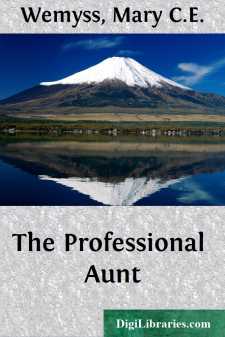Categories
- Antiques & Collectibles 13
- Architecture 36
- Art 48
- Bibles 22
- Biography & Autobiography 813
- Body, Mind & Spirit 142
- Business & Economics 28
- Children's Books 17
- Children's Fiction 14
- Computers 4
- Cooking 94
- Crafts & Hobbies 4
- Drama 346
- Education 46
- Family & Relationships 57
- Fiction 11829
- Games 19
- Gardening 17
- Health & Fitness 34
- History 1377
- House & Home 1
- Humor 147
- Juvenile Fiction 1873
- Juvenile Nonfiction 202
- Language Arts & Disciplines 88
- Law 16
- Literary Collections 686
- Literary Criticism 179
- Mathematics 13
- Medical 41
- Music 40
- Nature 179
- Non-Classifiable 1768
- Performing Arts 7
- Periodicals 1453
- Philosophy 64
- Photography 2
- Poetry 896
- Political Science 203
- Psychology 42
- Reference 154
- Religion 513
- Science 126
- Self-Help 84
- Social Science 81
- Sports & Recreation 34
- Study Aids 3
- Technology & Engineering 59
- Transportation 23
- Travel 463
- True Crime 29
The Professional Aunt
by: Mary C.E. Wemyss
Description:
Excerpt
Chapter I
A boy's profession is not infrequently chosen for him by his parents, which perhaps accounts for the curious fact that the shrewd, business-like member of a family often becomes a painter, while the artistic, unpractical one becomes a member of the Stock Exchange, in course of time, naturally.
My profession was forced upon me, to begin with, by my sisters-in-law, and in the subsequent and natural order of things by their children—my nephews and nieces.
Zerlina says it is the duty of one woman in every family to be an aunt. By that she means of course a professional aunt. She says she does not understand the longing on the part of unattached females—the expression is hers, not mine—for a larger sphere of usefulness than that which aunt hood offers. She considers that it affords full scope for the energies of any reasonably constituted woman; and no doubt, if the professional aunt was all that Zerlina says she should be, she would have her time fully occupied in the discharging of her duties.
Zerlina cannot see that it is not exactly a position of a woman's own choosing, although under strong pressure she has been known to admit that there have been cases in which women have been made aunts whether they would or no; and she thinks it is perhaps by way of protest against such usage that they so shamefully neglect their duties in that walk of life to which their bothers and sister-in-law have seen fit to call them.
Of course, when an aunt marries, she loses at once all the perfecting of the properly constituted aunt; and that is a thing to be seriously considered. Is she wise in leaving a profession for which all her sisters-in-law think she is admirably fitted, for one which the most experienced pronounce a lottery?
This is all of course written from Zerlina's point of view. She requires of a professional aunt many things. She must, to begin with, remember the birthdays of all her nephews and nieces, of Zerlina's children in particular. If she remembers their birthdays, it stand to reason, Zerlina's reason, that the sequence of thought is—presents.
The really successful aunt knows the particular taste of each nephew and niece. She knows, moreover, the exact moment at which the taste changes from a love for woolly rabbits to a passion for steam engines. Instinct tells her at what age a child maybe promoted, with safety, from wool to paint, and she knows the critical moment in a boy's life when a Bible should be bestowed. It usually, or perhaps I should say my experience is that it usually, follows the first knife, an ordinary two-bladed knife, and comes the birthday before a knife—"with things in it." The real boy must have a knife with things in it: a corkscrew,—I wonder why a corkscrew?—a buttonhook, a thing to take stones out of horses' hoofs, a thing to mend traces with—I know I am ignorant of the technical terms—but the hardest-hearted shop-assistant will never fail to help a professional aunt in the choice of a knife, unless by chance he should be unhappy enough never to have been a boy, and such cases are rare....


